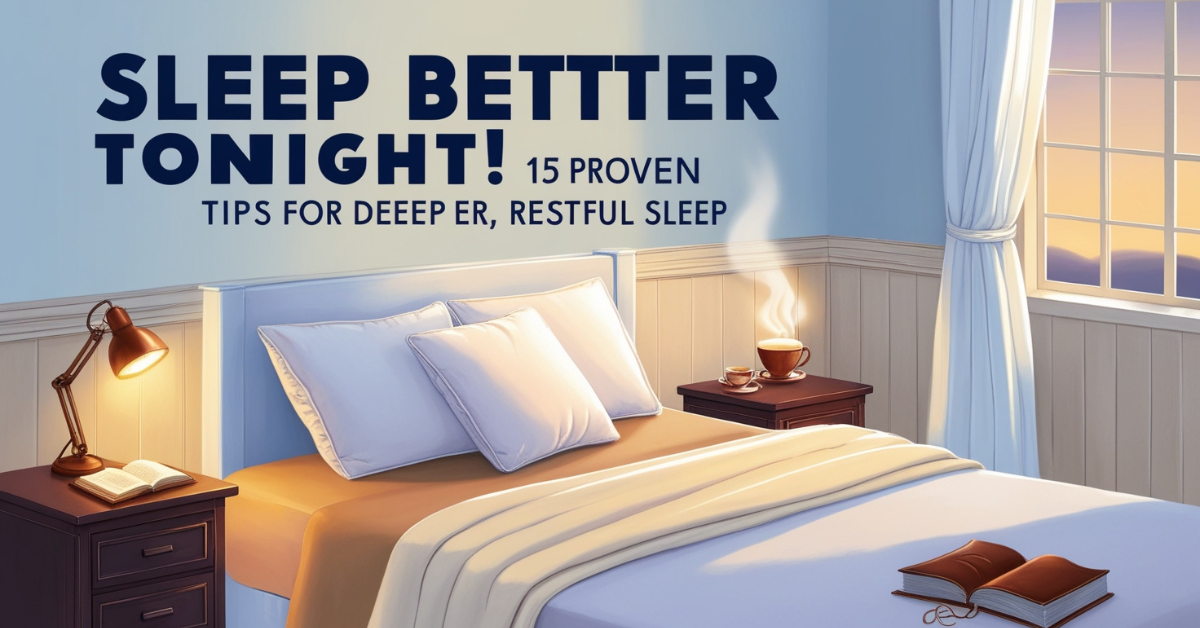Sleep Better Tonight! 15 Proven Tips for Deeper, Restful Sleep

Sleep matters. It’s as crucial as working out and eating well to stay healthy. When you sleep well, you feel better, think clearer, and keep your heart and immune system strong. Not sleeping enough can lead to long-term health problems like weight gain and diabetes. Let’s look at 15 ways to help you sleep better.
1. Get More Sunlight During the Day
Sunlight plays a crucial role in regulating your body’s internal clock also known as the circadian rhythm. Exposure to bright light during daytime hours signals your brain to stay alert. This, in turn, prepares your body to wind down when night falls.
- Simple Action: Make it a point to get 30 minutes of natural sunlight. Can’t step outside? A daylight lamp can offer similar advantages indoors.
2. Cut Down on Blue Light in the Evening
The blue light emitted by screens on phones, tablets, and computers can fool your brain into believing it’s still daylight. This prevents the release of melatonin (the hormone that makes you sleepy), which makes it challenging to unwind and drift off to sleep.
- Quick Fixes:
- Turn on the “night mode” or “blue light filter” options on your devices at night.
- Stay away from screens or switch them off at least 60 minutes before bedtime to let your brain calm down on its own.
3. Cut Out Caffeine Late in the Day
Caffeine has a long-lasting impact on your system often staying active for up to 8 hours. Consuming coffee tea, or soda later in the day can make it tough to fall asleep when bedtime rolls around.
- Tip: Try switching to decaf drinks or herbal tea without caffeine after 3 p.m. This approach lets you stay focused during the day and wind down at night.
4. Watch Out for Daytime Naps
Quick naps can give you an energy boost, but lengthy or late-afternoon naps might disrupt your nighttime sleep. Sleeping in the afternoon can throw off your body’s internal clock making it unsure when to rest.
- Suggestion: Limit naps to 20-30 minutes, and avoid napping after 3 p.m. This helps maintain your body’s natural rhythm.
5. Follow a Regular Sleep Pattern
Hitting the sack and getting up at consistent times keeps your body’s internal clock on track. This makes falling asleep and waking up without an alarm easier.
- Routine Hack: Set a fixed sleep schedule—even on weekends. Over time, this habit will become automatic.
6. Think About Taking Melatonin
Melatonin influences your sleep cycle regulation. Taking a melatonin supplement before bedtime can signal your brain to sleep, which can help if you struggle to fall asleep.
- Dosage Advice: Begin with a small dose about 1-3 mg, an hour before bedtime. Always consult a healthcare provider before you start a new supplement if you have health concerns.
7. Try Other Sleep-Friendly Supplements
Besides melatonin, other supplements can promote relaxation and sleep. Some common options include:
- Magnesium: Helps relax muscles and cut down stress.
- Valerian Root: A natural plant that makes you feel calm.
- Lavender Oil: People often smell it to relax.
- Remember: Try one supplement at a time and talk to your doctor if you take other medicines.
8. Don’t Drink Alcohol Close to Bedtime
Alcohol might make you sleepy at first, but it messes up your sleep quality. It gets in the way of REM sleep and can cause restless nights. It also makes you more likely to snore and have sleep apnea.
- Tip: Stop drinking alcohol a few hours before bed to help your body fall into a natural restful sleep pattern.
9. Get a Comfortable Mattress and Pillow
A good mattress and pillow can improve your sleep quality a lot. Bad bedding might cause pain, discomfort, and restless nights.
- Upgrade Suggestions:
- Find a medium-firm mattress that supports your body well.
- Buy a new mattress every 7-10 years and new pillows every 1-2 years to sleep better.
10. Set Up a Relaxing Bedroom Environment
A calm quiet, and dark bedroom helps your mind and body prepare to sleep. Think about things like temperature, noise, and light.
- Environment Tips:
- Make your room cool around 65°F (18°C).
- Use earplugs or a white noise machine if the noise bothers you.
- Put up blackout curtains to block light, which tells your brain it’s time to sleep.
11. Skip Big Meals Close to Bedtime
Eating late can mess up your sleep if you eat a lot and your body has to work hard to digest it. When your body focuses on processing food, it’s not ready to relax for sleep.
- Better Choice: Eat dinner at least 2-3 hours before bed. If you need a snack, pick something light like a banana or a few nuts.
12. Limit Liquids Before Bed
Drinking too much before bed has an impact on your sleep. It can make you go to the bathroom often at night, which interrupts your rest.
- Plan: Cut back on drinks about an hour or two before you hit the sack. Also, use the bathroom right before bed to help you sleep all night.
13. Practice Relaxation Techniques Before Bed
Stress and worry often keep people awake. To quiet your mind, try to add some relaxing activities to your nighttime routine.
- Ideas:
- Give meditation slow breathing, or easy yoga a shot.
- Put on some calm tunes or white noise to chill out.
- A warm bath or shower can also loosen your muscles and get your body ready to sleep.
14. Check for Sleep Disorders
If you can’t sleep well most nights, you should see a doctor to check for sleep disorders like sleep apnea restless legs syndrome, or long-term insomnia. Doctors can treat many sleep disorders, and finding out can boost your life quality.
- Next Steps: Talk to a doctor if you notice signs like loud snoring, waking up short of breath, or always having trouble staying asleep.
15. Exercise Often—but Not Right Before Bed
Working out can help you sleep better. It relieves stress and helps control your body’s energy. But exercising just before bed might backfire, leaving you too alert and full of energy.
- Ideal Timing: Try to complete your workout at least 3 hours before bedtime. Work out at the same time each day to help your body adjust to the routine.
FAQs on Getting a Night Sleep Better
What is the 10-3-2-1-0 Sleep Rule?
- This well-known rule provides a straightforward sleep strategy: 10 hours before bed stay away from caffeine; 3 hours before bed, avoid alcohol and big meals; 2 hours before bed, stop work or challenging mental tasks; 1 hour before bed, switch off screens. When you wake up, don’t hit the snooze button.
How Can I Fall Asleep Faster?
- Set a sleep schedule to help your body know when it’s time to sleep, cut down on blue light, and try relaxing with meditation or deep breaths.
Final Thoughts: Sleep Better
Sleep plays a crucial role in staying healthy. It’s as vital as eating well and keeping active. These tips can help you create a space and routine for better sleep so you wake up feeling fresh and ready to tackle your day.
Whether you’re making your bedroom comfy dealing with stress, or watching what you eat and drink, putting sleep first will boost your health and make your days better. Start with one or two tips and see what works for you.












